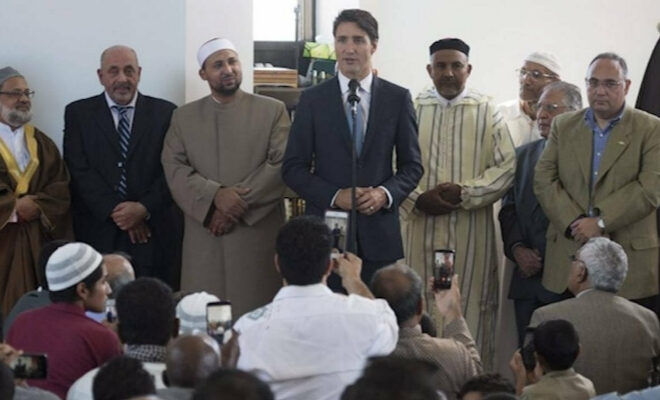2017 Quebec City Masjid Massacre: Has Anything Changed?

On January 29, 2017, Alexandre Bissonnette shot and murdered six Muslims at the Islamic Cultural Centre of Quebec City.
The victims of the assault were brothers: Ibrahima Barry, Mamdou Tanou, Khaled Belkacemi, Aboubaker Thabti, Abdelkrim Hassane and Azzedine Soufiane. May Allah (swt) have mercy on our fallen brothers and give patience and support to their families, ameen.
Bissonnette’s attack had triggered a wave of condemnation from Canadian society and politicians. Prime Minister Justin Trudeau and then Quebec Premier Philippe Couillard even termed the attack as an act of terrorism. Trudeau also set January 29th as a national day for remembrance of the attack.
However, the effects of the token gestures faded. Despite the fact that Bissonnette’s motives and actions were clear markers of terrorism, the courts sentenced Bissonnette with normal criminal charges. Not only that, but the Court of Appeal of Quebec actually reduced Bissonnette’s sentence from 40 years to 25 years.
Moreover, as if this attack never happened, the Quebec government continues to aggressively ostracize the Muslims living there through discriminatory legislation, i.e., Bill-21. How did we get to this point?
Government Policies Led to the Attack
Bissonnette’s attacks did not occur in a vacuum. Although it may seem like Bissonnette was a “lone wolf,” the truth is that his actions fed off years of government policymaking and media narrative-building.
Bouchard-Taylor Commission
In 2007-2008, the Quebec government under Jean Charest started the Bouchard-Taylor Commission (also known as the ‘Reasonable Accommodation Commission’). Charest launched the Commission in response to growing societal criticism towards visible minorities – notably Muslims and Sikhs – for not “integrating” into Quebec’s majority culture.
Thus, the Bouchard-Taylor Commission was, at its core, crafted to endorse and legitimize discriminatory and intolerant attitudes against visible minorities. This fact became obvious very quickly.
First, the Commission’s townhalls offered an official and legitimate platform for xenophobes to voice their views. In addition, the Commission catalogued xenophobic views as if they were legitimate.
Second, the Commission called upon Quebec governments to aggressively integrate minorities, especially Muslims. It explicitly called on banning religious symbols, like Hijab, in certain public sector posts.
Bill-60: Charter of Quebec Values
In 2013, the Quebec government under the PQ’s Pauline Marois introduced the Quebec Charter of Values, i.e., Bill-60. The heart of Bill- 60 drew on the Bouchard-Taylor Commission’s recommendation of banning public sector employees from wearing religious symbols.
While marketed as a blanket ban, Bill-60 affected Muslim women at a disproportionate scale by removing them from the workforce.
Bill-62: Quebec Niqab Ban
In 2017, the Quebec government – this time under the Quebec Liberal Party (QLP) – introduced Bill-62. It tried forbidding people accessing public services (such as health, education, childcare, and transport) from wearing ‘face coverings.’
Once again, like all of Quebec’s ‘secular-neutrality’ legislations up to this point, Bill-62 disproportionately targeted Muslim women. The courts suspended Bill-62. In fact, Quebec Superior Court Justice Marc-André Blanchard said the bill would cause “irreparable harm” on Muslim women.
One heinous aspect of Bill-62 is that the QLP introduced it months after the Quebec City Masjid Massacre. This reality tells us that Capitalist governments do not care about the link between their policies and the harm it causes people. Rather, they make policies based on their economic and/or ideological interests.
In this case, the Bissonnette’s attack had no bearing on their pursuit to marginalize the Muslim population. It also shows that the anti-Islam focus lives across party lines. PQ had introduced Bill-60, but the Quebec Liberals tried pushing Bill-62. Clearly, a deep and systemic hate towards Islam and Muslims is at play.
Dog-Whistle Politics
In parallel to the Quebec government’s discriminatory anti-Islam/Muslim efforts, the Canadian federal political scene was also doing its part to fuel animosity.
In 2011, the Harper government banned Muslim women from wearing the Niqab during the Canadian citizenship ceremony. Sister Zunera Ishaq took the issue to the court and, in February 2015, won the case when the lower court and Federal Court of Appeal said the policy was illegal.
In response, Harper said he would take this issue to the Supreme Court. He also said the niqab was “rooted in a culture that is anti-women.” In 2015, the Harper government introduced the “Zero Tolerance for Barbaric Cultural Practices Act” – i.e., Bill S-7. A major feature of Bill S-7 was an RCMP hotline that people could call to “report” what they see as ‘barbaric’ cultural practices.
Bill S-7 achieved two things.
First, it helped Harper gain credibility with xenophobes in Canada.
Second, it encouraged Canadians to look at Muslims with suspicion. Like Quebec’s legislations, Bill S-7 gave people the license to feel as if anti-Islam and anti-Muslim activities were acceptable.
We are seeing the ripple effects of these political tactics. Last month, the Canadian Medical Association Journal (CMAJ) published a tirade against the Hijab which claimed it was “child abuse.” Worse, the writer of the attack piece was a pediatric surgeon at McGill University.
Though not a violent or physical attack, the CMAJ letter shows us that well-established people in Canada (like a doctor) feel it is their right to discriminate against Muslims. Policies empowered this attitude.
Escalation of Hate
There is always a risk of another attack like this happening again. With anti-Islam/Muslim policies in play, certain groups in Canada feel they have a license to intimidate or attack our community.
In fact, the Quebec City Masjid reported at least seven against (including a severed pig’s head) in the lead up to Bissonnette’s assault.
Today, a growing number of Muslims all over Canada are reporting that they faced verbal or physical assault. In fact, according to Statistics Canada, Muslims reported 159 hate crimes to the police in 2015, this jumped to 349 in 2017.
We Cannot Trust the Political System
Today, the Muslim community is grappling with Bill-21. Like Bill-60 and 62, Bill-21 is another in Quebec’s stable of “secular neutrality” policies that plainly target Muslims.
Bill-21 bans civil service employees from wearing ‘religious symbols’ while working. In other words, a sister wearing hijab cannot be a teacher, civil bureaucrat, nurse, doctor, or any other public sector employee. If they choose to wear hijab, the government can suspend or fire them from their jobs.
Once again, it was the Quebec Liberals who introduced Bill-21. This fact shows us that anti-Islam and anti-Muslim hate is structural and lives across party lines. It is not limited to only the PQ or Conservatives. However, Bill-21 also exposed the true faces of the federal parties.
Though each leader expressed their personal disagreement with Bill-21, none of them would commit to launching a legal challenge.
Granted, the NDP very recently changed their position to supporting legal action, but while this bill was forming, it was silent like the Liberals and Conservatives.
Ultimately, it is easy for politicians to offer token gestures and words, but they will not take concrete and meaningful action. They will put their electoral interests (in this case, votes in Quebec) ahead of principles, even when the lives and wellbeing of people are at stake.
For the Muslim community, this fact should plainly spell out that supporting any of these political parties is not a sound strategy. In fact, as Muslims, we cannot approach this issue (which is very deep-rooted) in a reactionary way, nor should we settle for token gestures.
What Can We Do?
As Muslims, we must always start by looking at our problems through the lens of Qur’an and Sunnah. We cannot produce solutions based on what we personally think works, but rather, based on what Allah (swt) allows and/or commands us to do. We are accountable to Allah (swt).
Avoid the Political System
When confronting anti-Islam/Muslim hate in Makkah and Ta’if,
Rasul’Allah (saw) did not participate in the political system. In fact, he consciously rejected it. Islam does not allow us to vote as that means delegating other people to legislate in our names. Legislation is the sole right of Allah (swt).
Thus, our political mindset should not be one of conforming to the system, but rejecting it, like Rasul’Allah (saw) and the Sahaba (ra) had done. This secures us the support of Allah (swt), the one and only Master, in our struggles. Conversely, if we participate in the system, we go against Allah’s (swt) commands.
Temporary Measures
The lives of Rasul’Allah (saw) and the Sahaba (ra) offer a roadmap of what we can do. For example, when in Abyssinia, the Muslim community rallied as one behind Jafar ibn Abi Talib (ra). They also appointed him (ra) as their spokesperson and, in turn, he presented their case to the Najashi.
This shows us the importance of uniting under one leadership. Not only that, but this leadership can only speak in terms of Islam. Jafar (ra) did not dilute the truth of Isa (as) to the Christians, even though he and the Sahaba (ra) were at risk of deportation. However, Jafar (ra) still used the tools Islam permitted him to make his case in the court of public opinion and the court of law.
Thus, we should double-down on securing our Islamic rights in the court system. In fact, it was the courts that struck down Harper’s niqab ban and Bill-62.
Our community should also expose how the political elite use bigoted politics to deflect attention from their failures, such as rocketing inflation, crumbling healthcare, and other problems.
Permanent Solutions
Though Islam allows us to take measures like court action and debate, these are not the actual solutions to our problem. Like all Muslims in the West, we do not live in our own homeland. Rather, we live in lands that run on an ideology (Capitalism) that wants to extinguish Islam.
For Rasul’Allah (saw) and the Sahaba (ra), the real solution came through the rise of Madina, i.e., the first Islamic State and the cradle of the Khilafah. In fact, Rasul’Allah (saw) called the Sahaba (ra) in Abyssinia to Madina, thus showing how the Islamic State/Khilafah is the true homeland of a Muslim.
Thus, our political mission should be to re-establish the Khilafah Rashidah in the Muslim lands. Allah (swt) has given us the roadmap to achieving this mission through the Qur’an and Sunnah. This is the vital issue of our time. If we do not address it, we will continue to be at risk of future discrimination and attacks.








